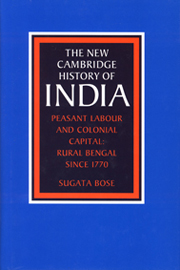5 - Resistance and consciousness
Published online by Cambridge University Press: 28 March 2008
Summary
Modern Bengal's agrarian history was forged at the points of contest and compromise between the colonial state and the dominant land-holding and capital-controlling classes on the one hand and the subordinate sectors of smallholding and labouring society on the other. A combination of material need and culturally informed value of the smallholding and landless labouring majority generated imperatives which challenged those deriving from the colonial, land-holding and capital-controlling establishment. The demands of smallholders and labourers for subsistence, security and social conditions reflective of their notion of human dignity sought to resist and restructure relations governing access to land, work, consumption and production imposed upon them. The course of agrarian history was influenced by an undercurrent of everyday resistance to inequities and periodic surges of effective resistance which dismantled the established structures of domination.
The older historiography of agrarian India generally privileged the landed and the powerful. Recent trends in scholarship have aimed at restoring to the subordinate social groups their ‘subjecthood’ in the making of history. Reacting against the concentration on insurgency or the dramatic instances of revolt in the literature on resistance, some writers have begun to stress the importance of the less ubiquitous but more frequent acts of defiance. Yet, paradoxically, an over-emphasis on the everyday processes of contest and compromise might obfuscate the reality of social dominance and leave a less than accurate impression of the ‘active’ agency of labour resistance contributing to a form of social equilibrium. Moreover, everyday resistance along class lines to ensure subsistence from the peasant smallholding often entailed implicit complicity in domination along lines of gender and generation.
- Type
- Chapter
- Information
- Peasant Labour and Colonial CapitalRural Bengal since 1770, pp. 140 - 180Publisher: Cambridge University PressPrint publication year: 1993



